.png)
How do residents in your community get the information they need to stay safe and informed when disaster strikes? Government media has a critical role in emergency response. Whether it’s coordinating with public safety partners or delivering life-saving updates, there are lots of tools and strategies local governments can use to enhance emergency preparedness.
Build Trust Before the Crisis
Trust doesn’t happen overnight—it’s built through consistent, transparent, and accessible communication. Municipal video initiatives don’t just broadcast information; they create connections. So, it’s important for PEG stations to provide information and start engaging residents before emergencies happen.
CCX Media in Minnesota, for example, has spent significant time building their audience in the northwest suburbs of Minneapolis. As a result, they have become a trusted source for emergency updates, sometimes even outperforming commercial news channels.
In 2023, the devastating fires in Lahaina on Maui underscored the importance of pre-crisis planning. Akaku, Maui's community media organization, served as a lifeline by coordinating between FEMA, state agencies, and local townships. They ensured critical updates reached displaced residents—whether through multilingual services, email subscriptions, or SMS alerts.
To learn more about how community TV channels like CCX Media and Akaku have played a vital role in keeping residents informed during crises, check out the Government Video Podcast episode featuring Alliance for Community Media President, Mike Wassenaar.
How Can You Prepare?
You don’t have to wait for a tragedy to improve accessibility and outreach. Start creating PSAs, evacuation guides, and emergency-preparedness videos now. Show residents where shelters are, map evacuation routes, and explain what resources are available. Using video to show—not just tell—can make all the difference.
By prioritizing accessibility in government communications, your city is already laying the groundwork for effective emergency communication. For IT directors and AV specialists, this means ensuring media workflows are ADA-compliant, so no resident is left out.
Communication redundancy is also essential. If cellular networks fail, can your city pivot to radio or alternative platforms? Using multilingual audio services and diverse delivery methods like streaming, social media, and even low-power FM radio can be game-changers in a crisis.
Collaboration is also key. Are your city’s media workflows designed to work seamlessly with emergency response teams? Are you amplifying your message across platforms? From housing updates to environmental alerts, having these systems in place can help your community be ready for anything.
Emergency preparedness isn’t just about having the right tools; it’s about ensuring those tools are secure. Network security is a growing concern for municipal IT directors managing enterprise video systems, but resilient and secure solutions can help cities expand their reach while protecting sensitive data.
Keep Your Community Informed
Government media can help reduce the chaos during a weather event, natural disaster, or other emergency—and help your community recover. But emergency preparedness is about more than just responding to disasters. To make sure your message is heard loud and clear by the community you serve, you need to be proactive in building resilient communication systems and community trust. Educate your residents now and make sure you have the infrastructure in place to reach them when they need you the most.
Need advice on how to get started? Contact our team. Don’t delay, start planning for emergencies today!
Event Replay - Demystifying Closed Captioning: What WCAG 2.1AA Really Requires for Government Video
Get clarity on WCAG 2.1AA captioning requirements. Learn what’s required, what’s recommended, and how to keep your government video content compliant.
.png)







.png)




